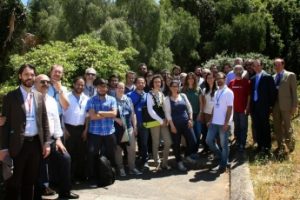A PERFECT UNION: Advanced technologies and mathematical modelling for improved wastewater treatment
 Despite rumors to the contrary, the need to improve the effluent quality of wastewater treatment plants still engages the interest of the scientific community. Although wastewater treatment plants are designed with the main aim of protecting the environment, the need to reduce (both in developing and industrialized countries) water use and the amount of pollutants discharged into nature, still makes wastewater treatment a crucial aspect of both scientific research and environmental protection.
Despite rumors to the contrary, the need to improve the effluent quality of wastewater treatment plants still engages the interest of the scientific community. Although wastewater treatment plants are designed with the main aim of protecting the environment, the need to reduce (both in developing and industrialized countries) water use and the amount of pollutants discharged into nature, still makes wastewater treatment a crucial aspect of both scientific research and environmental protection.
Over the past 15 years the wide range of innovative technologies, such as membrane bioreactors and moving bed biofilm reactors, has allowed us to improve effluent quality. Indeed, innovative technologies have ensured the achievement of stringent effluent limits by reducing the volume of pollutants compared with conventional wastewater treatment. The spread of innovative technologies has made possible by the progressive investments made by the scientific, manufacturing and operator sectors.
Mathematical modelling is an essential tool
Scientific efforts have been focused on better understanding the behavior, limitations and advantages of using new innovative technologies. Within this context, knowledge upgrading has undoubtedly been supported by the progress of computational tools and mathematical modelling. Mathematical modelling is, and has always been, an essential tool to test, predict and optimize the behavior of real or pilot wastewater treatment plants.
The work of several International Water Association Specialist Groups, including on Bioflim and Advanced Oxidation Processes, and the Task Group on Benchmarking of Control Strategies for Wastewater Treatment Plants, has demonstrated the importance of both innovative technologies and mathematical modelling, and that the exchange of scientific and technical information among researchers and practitioners involved in these fields is crucial for effectively advancing knowledge. Indeed, mathematical modeling has the advantage of allowing scenario analysis before designing the real plant in order to ensure an optimised system.
Despite the quite mature scientific knowledge on both advanced treatment systems and in the mathematical modelling field, this knowledge is unbalanced among practitioners, operators and designers. Therefore, advanced technologies and sophisticated mathematical tools have been set up over the years, but, if adopted at all, they are scarcely ever properly adopted to optimize the design of new plant or the behavior of existing ones. In this regard, the spread and adoption of the potential of innovative technologies and mathematical tools becomes a critical aspect to focus on so we can move towards improved environmental protection.
Move forward with knowledge dissemination
The University of Palermo second edition of the “Advanced Course on Innovative Wastewater Treatment and Mathematical Modelling”, aims to spread the word advanced technologies and mathematical modeling. Organised over four days, the course features leading authorities who will share their expert knowledge and experiences. The course will provide a comprehensive overview and a discussion platform on recent advances and trends currently under development, in the context of wastewater treatment and modelling.
The course aims to enable participants to identify the key peculiarities of each advanced wastewater treatment discussed during the course (Hybrid biofilm, activated sludge systems, membrane biorecators); identify the key operating factors affecting the pollutants removal efficiency for each of the advanced treatments; and understand how to model the biological and physical processes occurring during the wastewater treatment.
On this issue, participants will be able to formulate mathematical models of wastewater treatment plants on the basis of their scope; communicate about wastewater treatment plants using mathematical models; identify the appropriate methods to solve mathematical models and obtain valid solutions; and control wastewater treatment plants by adopting mathematical models.
Save the date for the upcoming Advanced Course on Innovative Wastewater Treatment and Mathematical Modelling in Palermo, Italy, May 16-19, 2016.

